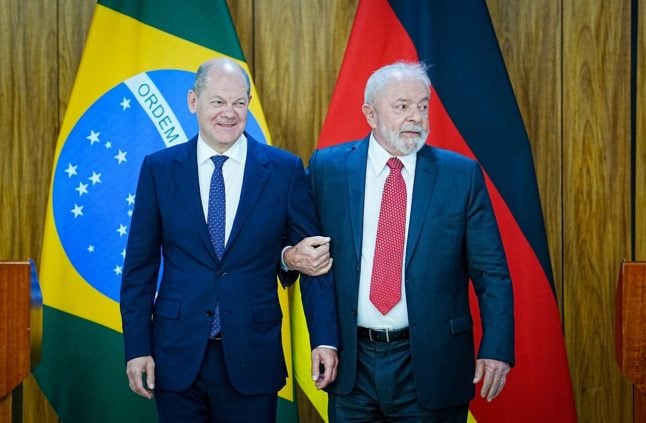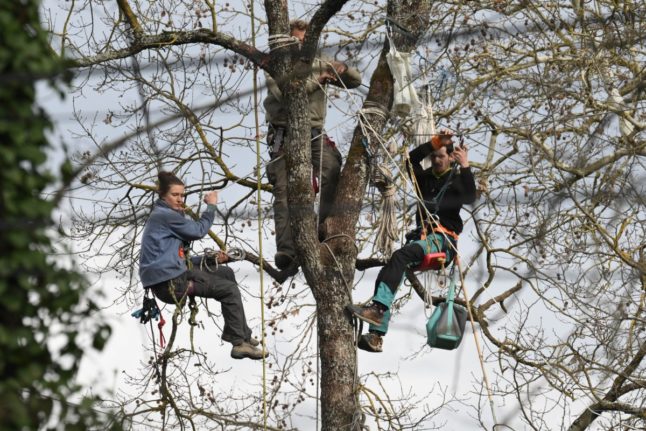The package includes a brand-new $33.6 million in aid for Brazilian states for rainforest protection, on top of another $38 million already announced for an Amazon protection fund to which Germany and Norway had halted payments under climate-skeptic Bolsonaro.
Protection of the Amazon — a crucial sink for planet-warming carbon dioxide — was high on the agenda for talks between Scholz and Brazil’s leftist new President Luiz Inacio Lula da Silva that also aimed to “deepen the resumption of relations,” according to the Brazilian presidency.
Scholz was the first German chancellor to visit Brazil since 2015, and the first Western leader to meet Lula since he became president on January 1 after four years of frosty relations with Brazil under far-right Bolsonaro.
Shortly before Scholz’s arrival in the capital Brasilia, German economic cooperation minister Svenja Schulze announced her country would make additional funds available for Amazon preservation after “difficult years”.
READ ALSO: ‘We’ve made a community’: Who are the Brazilians in Germany and where do they live?
“Brazil is the lung of the world. If it has problems, we all have to help it,” Schulze said at a press conference in Brasilia with Lula’s new environment minister Marina Silva.
Bolsonaro’s four-year term was marked by a surge in fires and clear-cutting in the rainforest.
Average annual deforestation on his watch rose by 59.5 percent from the previous four years, and by 75.5 percent from the previous decade, according to government figures.
German funds for Brazil would also include $32 million for energy efficiency projects for small and medium companies, $9.7 million for “sustainable supply chain projects,” $5.7 million for renewable energy use in industry and transport and $14.2 million for reforestation of degraded areas, according to a Germany embassy statement.
$87 million would go towards low-cost loans for farmers to “reforest their land.”
Amazon destruction was a major sticking point in a trade deal between the European Union and the Mercosur grouping comprised of Argentina, Brazil, Paraguay and Uruguay. The blocs reached an agreement in 2019 following 20 years of talks, but it has not yet been ratified.
‘Very interesting partners’
Scholz, who visited Chile and Argentina before heading to Brazil, said in Buenos Aires on Saturday a “quick conclusion” was needed to the trade deal impasse, adding that with Lula in place, “we are in a better position.”
Lula had presided over a sharp drop in deforestation when he previously led Brazil from 2003 to 2010, and has vowed to reboot environmental protection.
READ ALSO: How climate change is threatening Germany’s forests
He has said it was “urgent” for a deal to be concluded, but stressed on the campaign trail that further negotiation was needed to ensure Brazil can pursue “our interest in reindustrializing.”
Energy is also on the agenda for talks between the leaders of Europe and South America’s biggest economies. German business is seeking new opportunities overseas following the economic shock caused by Russia’s invasion of Ukraine, and as concerns grow about reliance on China.
All three countries on Scholz’s itinerary — Argentina, Chile and Brazil — are rich in natural resources and “very interesting partners,” a government source in Berlin said.
In an interview Saturday with the Grupo de Diarios America (GDA) consortium of South American newspapers, Scholz said Germany wanted to boost cooperation with Latin America and the Caribbean on “renewable energies, green hydrogen and responsible trade in raw materials.”
A Berlin government source said Germany would use the Latin American tour to drum up further international support against Moscow as the war in Ukraine drags on.
Argentina, Chile and Brazil have criticized the invasion of Ukraine at the United Nations but have not adopted sanctions against Moscow.
Lula caused shock last year when he said Ukrainian President Volodymyr Zelensky was “as responsible as” Russian President Vladimir Putin for the conflict.



 Please whitelist us to continue reading.
Please whitelist us to continue reading.
Member comments